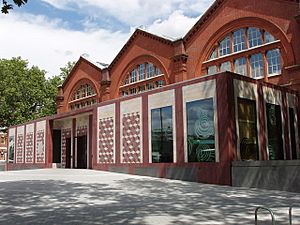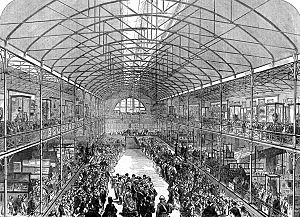- This page was last modified on 15 April 2025, at 02:15. Suggest an edit.
Young V&A facts for kids
 |
|
| Lua error in Module:Location_map at line 420: attempt to index field 'wikibase' (a nil value). | |
| Established | 1872 |
|---|---|
| Location | Bethnal Green London, E2 United Kingdom |
| Visitors | 386,944 (2019) |
| Public transit access | |
|
Listed Building – Grade II*
|
|
| Designated | 27 September 1973 |
| Reference no. | 1357777 |
| Area | 1.5 acres (6,100 m2), 145 galleries |
Young V&A, formerly the V&A Museum of Childhood, is a branch of the Victoria and Albert Museum (the "V&A"), which is the United Kingdom's national museum of applied arts. It is in Bethnal Green in the East End of London, and specialises in objects by and for children.
History
| London Museum Site Act 1868 | |
|---|---|
| Act of Parliament | |

|
|
| Long title | An Act to provide for the Acquisition of a Site for a Museum in the East of London. |
| Citation | 31 & 32 Vict. c. 8 |
| Dates | |
| Royal assent | 28 February 1868 |

The official opening of the Bethnal Green Museum by the Prince of Wales in 1872.
The museum was founded in 1872 as the Bethnal Green Museum. The iron structure reused a prefabricated building from Albertopolis which was replaced with some early sections of the modern V&A complex. The exterior of the building was designed by James William Wild in red brick in a Rundbogenstil (round-arched) style very similar to that in contemporary Germany.
The building was used to display a variety of collections at different times. In the 19th century, it contained food and animal products, and various pieces of art including the works which can now be seen at the Wallace Collection. It was remodelled as an art museum following World War I, with a children's section which subsequently grew in size. In 1974 the director of the V&A, Sir Roy Strong, defined it as a specialist museum of childhood.
Of all the branches, Young V&A has the largest collection of childhood objects in the United Kingdom.
The mission of the museum is "To enable everyone, especially the young, to explore and enjoy the designed world, in particular objects made for and made by children." It has extensive collections of toys, childhood equipment and costumes, and stages a programme of temporary exhibitions.
The museum closed in October 2005 for the second phase of extensive renovations, costing £4.7 million. It reopened in December 2006.
In 2019 a major transformation of the museum began. "Over 30,000 objects which had been on display or in storage at the museum" were audited and packed. After temporary storage at South Kensington, they were to join the rest of the V&A East Museum at Stratford Waterfront "in a few years time".
Inside the museum was a cast iron statue by John Bell, which has been based there since 1927. It came originally from the Great Exhibition of 1851. The Eagle slayer shows a marksman shooting at an eagle which has slain the lamb that lies at his feet. This has now been moved to the entrance of the Coalbrookdale Museum as it was cast in the Coalbrookdale Foundry.
The museum is a Grade II* listed building.
The museum's reopening was announced for 1 July 2023.
In June 2023, the museum - under the orders of its director Tristram Hunt - removed two books on gender and sexual orientation, as well as a poster by the charity Stonewall that read "Some people are trans, get over it!", from the museum ahead of its reopening. The V&A Staff LGBTQ Working Group and trade unions PCS and Prospect opposed the removals. Union representatives appealed the decision in a meeting with Hunt, who rejected their request to have the items returned to the museum.
Transport connections
| Service | Station/Stop | Stop Letter | Lines/Routes served | Distance from V&A Museum of Childhood |
|---|---|---|---|---|
| London Buses |
Bethnal Green Station |
Stop A | 106, 254, 309, 388, D3, D6 | |
| Stop B | 8, 309, D6 | |||
| Stop D | 8, 388, D3 | |||
| Old Ford Road |
Stop G | 106, 254, 388, D6 | ||
| London Underground |
Bethnal Green | |||
| London Overground |
Cambridge Heath | London Overground | 400 metres walk |
See also
- Anthony Burton (former director)
